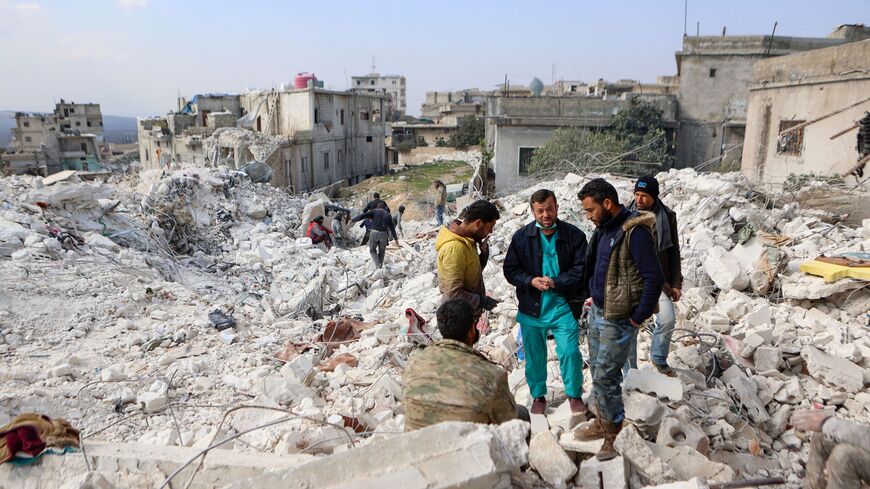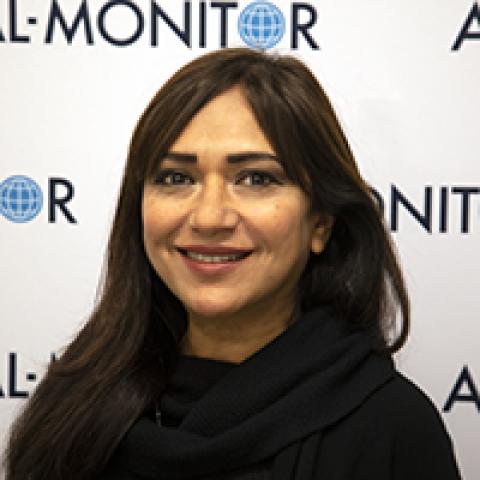The first aid convoys from Kurdish-run northeast Syria were allowed to cross into the northwest part of the country that was leveled by the massive earthquakes centered in Turkey, Syrian Kurdish leaders confirmed to Al-Monitor Monday, saying that US pressure had likely forced Ankara to cave.
The breakthrough followed a weeklong standoff between the Kurdish-led, self-described Autonomous Administration of Northeast and East Syria (AANES) and Turkish-backed Sunni rebel groups.
Salih Muslim, co-chair of the Democratic Unity Party — which shares power in the AANES — told Al-Monitor that 55 trucks carrying relief supplies “collected by the people of Deir ez-Zor and Raqqa” and a further 53 trucks containing aid “donated by the people of Manbij” who are all governed by the AANES had crossed via Manbij into Turkish-occupied areas.
Muslim was unable to confirm how far the convoy was permitted to travel, saying, “To be honest we cannot be sure all the aid will get to the victims because of the culture of impunity and lawlessness of the gangs there.” Muslim was referring to various Sunni rebel factions that have been accused by the United Nations and the United States of engaging in lootings, kidnappings, rape and murder in the broad swathes of Kurdish-run territory they seized together with the Turkish army. “I don’t know for certain, but I think American pressure forced them to let the convoys through.”
Another truck — this one carrying aid from an international aid organization in northeast Syria to Idlib — was also allowed to pass today.
Sinam Mohamed, representative of the AANES-affiliated Syrian Democratic Council in Washington, told Al-Monitor that the trucks had been waiting to cross since Feb. 6, a day after the 7.8 and 7.7 tremors ripped through southern Turkey and northwest Syria killing more than 35,000 people. At least 3,581 perished in Syria, a country already ravaged by over a decade of conflict.
The township of Jinderes, home to thousands of Kurds, was among the worst hit with more than 500 people dying there alone.
An estimated 5.3 million Syrians have been left homeless by the earthquake. Many Syrians accuse the world of abandoning them as the global response focused on Turkey in the early days.
“My contacts at the State Department told me they wanted to help us set up an aid corridor to northwest Syria running through our territory. It’s shameful that it took so long for permission to be granted. Lives were lost because of these dirty games,” Mohamed said.
Two other AANES officials speaking not for attribution said US government officials told them they were in contact with the Turkish Foreign Ministry to seek authorization to let Syrian Kurdish aid go through, but its initial response had been negative.
Muslim said all markings linking the trucks in the convoy to the AANES had been stripped. “That was one of the conditions for letting them through,” Muslim noted.
The State Department did not respond to Al-Monitor’s request for comment.
.subtext-iframe{max-width:540px;}iframe#subtext_embed{width:1px;min-width:100%;min-height:256px;}Turkey likely blocked aid convoys from the Syrian Kurdish administration on the same grounds that the Turkish army has been attacking its armed wing for the past eight years, namely that they are “terrorists.” The accusation stems from the fact that numerous cadres running the area previously held positions in the Kurdistan Workers Party (PKK). The group is listed by the United States and the EU as a terrorist group and has been fighting the Turkish army since 1984 for varying models of Kurdish self-rule. Syria’s Kurdish leaders, however, have repeatedly said they have no organizational links to the PKK and they want peaceful ties with Ankara.
Turkey is likely worried that any aid from Syrian Kurdish authorities would lend it legitimacy among locals — above all in Afrin, a Kurdish majority enclave that was wrested by Turkish forces in 2018.
The Syrian Democratic Council’s Ahmed accused Turkey on Monday of carrying out a deadly drone strike on the town of Kobani, posting pictures of the targeted individual and a charred vehicle on Twitter.
Ankara has allowed the Barzani Charity Foundation set up by the Barzani family, which leads the Kurdistan Regional Government (KRG) in Iraq, to send aid to Afrin and other parts of northern Syria, but on condition that the convoys go through Turkey and not northeast Syria. Karzan Noori, who is in charge of the campaign, told Al-Monitor, “We are the first international aid organization to enter Afrin.”
Noori said the charity was coordinating efforts with Turkey’s state-run disaster relief organization (AFAD) and the Turkish Red Crescent. The group is providing hot meals, tents and blankets to victims in Syria and Turkey alike. Queried about Turkey’s refusal to let convoys through the northeast, Noori said, “I don’t get involved in politics. I just do my job.”
AANES officials debunked claims in the Iraqi Kurdish media that they had denied access to the charity. Ilham Ahmed, president of the Executive Committee of the Syrian Democratic Council (SDC), told Al-Monitor via WhatsApp, “All humanitarian aid can go through our territory. We have absolutely no issue with that.”
Relations between the Syrian Kurds and the KRG are chilly in the best of times, mainly over the latter’s close ties to Ankara. Turkey has thousands of troops spread across Iraqi Kurdistan to fight the PKK. The KRG often defers to Turkish demands to squeeze the AANES.
Bassam al-Ahmed, a Syrian human rights activist and founder of Syrians for Truth and Justice that archives abuses in Syria, accused Ankara of holding northwest Syria “hostage” and truncating it from the rest of the country for political gain. “They are prioritizing self-interest over human life. It is completely unacceptable,” Ahmed told Al-Monitor.
Mohamed concurred. “This is an opportunity to melt the ice between us and fellow Syrians in the northwest. But we are not being permitted to,” she said.
AANES officials told Al-Monitor they had offered help to the White Helmets, the volunteer search and rescue outfit that shot to fame for their courage in retrieving civilians in northwest Syria struck by the Assad regime's bombs.
Raed al-Saleh, who runs the White Helmets, told Al-Monitor, “We welcomed the offer of aid from the Autonomous Administration, but as you know there are authorities who control the cross-border lines, and we as an organization don’t have control over them.” Saleh added that he had been in contact with them to secure their approval. “We don’t know what will happen,” he said.
To be sure, the aid effort for Syria has been hobbled by politics from the outset.
Syrian President Bashar al-Assad cynically blamed Western sanctions on his government for the number of deaths. On Feb. 10, in a bid to rob him of that argument, the US Treasury’s Office of Foreign Assets Control announced that funds sent to Syria for earthquake relief that might otherwise be barred by US sanctions would be exempted for about six months.
Damascus insists that all aid be distributed through Assad's own government, arguing that any aid deliveries to rebel-held areas are a breach of its sovereignty. Western governments are loath to do so because much of it winds up lining the pockets of corrupt officials who sell it on the black market or distribute it to loyalists.
Russia, meanwhile, has consistently shot down efforts by the United States and other permanent members of the UN Security Council to expand the number of crossings into rebel-held territory through which the international body is authorized to deliver aid.
The United States on Sunday urged the international body to “vote immediately on a resolution” that would authorize additional border crossings. But as Al-Monitor’s State Department correspondent Elizabeth Hagedorn reported, Russia is likely to veto any such measure.
Currently, UN relief to war-ravaged northwest Syria is permitted solely through the Bab al-Hawa crossing from Turkey. An estimated 4.2 million people, many of them repeatedly displaced as they fled regime violence, depend almost exclusively on that aid.
The Syrian government has hindered the passage of some 100 trucks carrying mainly fuel from the Kurdish region, an official for the Kurdish Red Crescent who is helping run that effort told Al-Monitor in a telephone interview. The official, who spoke anonymously for security reasons, said the Syrian government was demanding that they hand over all their cargo. The Kurdish Red Crescent refused. “Based on past experience, we are concerned that they will keep everything for themselves,” the official added.
The convoy was initially headed for Afrin, but after being denied entry by Turkish-backed groups, it diverted to Aleppo’s Shaikh Maqsud, a Kurdish-majority area. But only part of its load was allowed into Aleppo, the official said. The rest remains parked at an undisclosed location until the Syrian government drops its demands.
The bickering has left international donors frustrated. “We are trying to tell everyone ‘put politics aside.’ This is the time to unite behind the common effort to support the Syrian people,” said Geir Pederson, the UN special envoy for Syria who landed in Damascus on Sunday.
In a further twist, Hayat Tahrir al-Sham — the al-Qaeda offshoot that controls most of Idlib — refused to let in a UN convoy carrying aid from Damascus. The UN and the United States have designated the group as terrorists. The group’s leader, Mohamed al-Jolani, has been trying to shed the label by presenting himself as a moderate pragmatist. But the group's rejection of UN aid on the grounds that it was coming from regime-held areas will surely raise further questions about its true motives.







